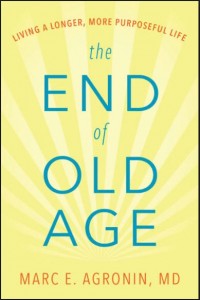Can This Really Be the End of Old Age?

As one of America’s leading geriatric psychiatrists, Marc E. Agronin, MD sees both the sickest and healthiest of senior members of society; he observes what makes their lives better and more purposeful, and what doesn’t. The latest scientific research and Dr. Agronin’s first-hand experience are brilliantly and often movingly distilled in his newest book, The End of Old Age, which is both a call and a plan to no longer see aging as an enemy and start seeing it as a developmental force for enhancing wellbeing, meaning and longevity.
 Realistic and optimistic, The End of Old Age empowers readers and provides the template for aging better by showing you how to value the aging process, guide yourself through stress, and find ways to creatively address change for the best possible experience and outcome.
Realistic and optimistic, The End of Old Age empowers readers and provides the template for aging better by showing you how to value the aging process, guide yourself through stress, and find ways to creatively address change for the best possible experience and outcome.
This book has a simple message: aging brings strength. When we realize the truth of this message, we can begin to end the tired and constricted notions of “old” that we internalize throughout our lifetime and that serve to denigrate and limit our aging self and perpetuate an ageist culture. To achieve this understanding, we must recognize the immense potential of our aging self, even in the face of common and expected struggles. We must learn how to age in a creative manner that is both the antidote to feeling old and the elixir of aging well.
The experience of aging and only aging, then, helps us perpetually develop five core strengths: knowledge, judgement, empathy, creativity, and insight. Put together, they compose the greatest gift of aging: wisdom. Logically and practically speaking, aging changes us in fundamental ways that age twenty-one can’t touch:
- Time brings us an accumulation of knowledge, experience and skills.
- We learn lessons from trial and error that enhance our judgement and force us to persevere in the face of adversity.
- Failure leads to humility, gratitude, empathy, and healthy dependence on others.
- Ambition and a desire for legacy motivates us to build, compose, and create new things.
- The approach of death reshuffles our priorities and brings us increased insight and a transcendent perspective on life.
If you ask long-lived people what their secret to life is, you will get a diverse and highly personalized range of answers. Some of these responses may apply to your own life; some may seem strange or even counterintuitive. The bottom line is that you have to determine your own meaningful path, built upon your unique age-given strengths of wisdom, purpose, and creativity. This action plan will help you identify, develop, and optimize these age-given strengths and appreciate your own age culture.
The action plan is simple and requires a few hours of your time. It requires that you have an open mind, a willingness to examine your life, and perhaps a few trusted people to provide input. The action plan consists of five basic steps:
- Reserve
Define your reserve. This step will help you fully appreciate the scope of your wisdom.
- Resilience
Examine your resilience. This step will highlight your purpose in life.
- Reinvention
Consider pathways for renewal and reinvention. This step will identify potential barriers to change, light up your age culture, and spark your creativity.
- Legacy
Consider your legacy. What do you want to leave behind for others and for the future? The answers may prompt important decisions or creative endeavors.
- Celebration
Plan a ritual or ceremony to celebrate your aging. We have rituals and ceremonies for every major transition in life, but not aging. Now that you’ve reexamined your own aging in a positive light, find a way to celebrate it.
In essence, we have the ever-present opportunity to revise and redo our aging process to bring the best possible experience and outcome.
Video on the book/process:


